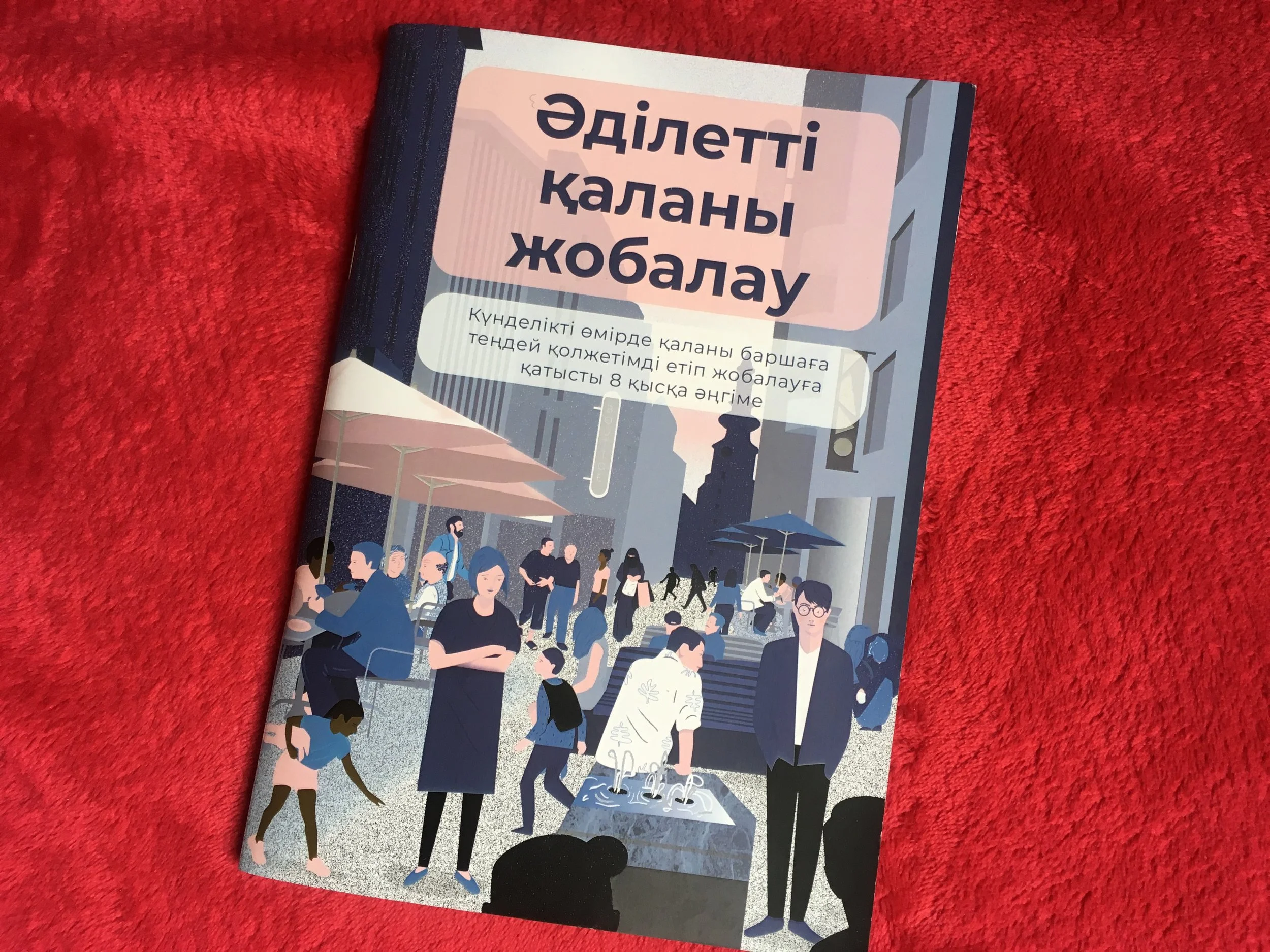Street prostitution is usually a priority for displacement from gentrifying neighbourhoods. Focusing on Alhambra neighbourhood in Brussels and Józsefváros in Budapest, this research delineates the measures taken by local governments, police and other local actors to displace street prostitution. The research aims at identifying those measures, reflecting upon their implications and investigating the outcomes of the same. Simultaneously, changes in the urban landscape and regulations aimed at displacing prostitution, as well as changes in the landscape of street prostitution, are documented and mapped. Noting these processes and occurrences, I conclude by elaborating on recommendations collected throughout the research that address the local government.
Cartoon_How to Design a Fair Shared City? in Russian and Kazakh language
On April 26 2019 in Almaty, Urban Forum Kazakhstan introduced the translation of the Kazakh language into the book "How to Design a Fair Shared City?" and met with the editor of the book. The work of the Czechoslovakia based urbanist Milota Sidorova is based on comic-book stories following needs of diverse city's inhabitants that are not always taken into account when designing streets and sites in the city. Urban Forum Kazakhstan has invited Milota to launch the book that was translated into Kazakh (by Erter Orazay) to Kazakhstan to introduce also her works and perspectives on public space to local readers. Presentation of this book was organized by WPS Prague and Almaty's Landstudio Architecture Bureau.
Report_Summary: Life and the Status of Women in the North Caucasus. Irina Kosterina
What makes up the daily life of the woman who lives in the North Caucasus? What does her sense of self consist of? What are her fears, dreams, and attitudes toward career, family life and relationships? What kind of changes she would like to see and bring about in her life? The research of Heinrich Boell Foundation «Life and the Status of Women in the North Caucasus» was conducted as a serious attempt to answer these questions.
#timefor50: Time for Equality RebelArchitette Report and Campaign
#timefor50: Time for Equality RebelArchitette launch a new awareness campaign for a fair representation of gender in architecture
After the issuu of their first digital book "ARCHITETTE = WOMEN ARCHITECTS in May 2018, the group of digital activists confirms its commitment to combat discrimination in the architecture profession. RebelArchitette are presenting a statistics report on the presence of female speakers at architecture events over the last two years and are launching the hashtag #timefor50, symbol of this new campaign in the name of equal representation in the design world.
Book_Restless Cities: Lessons from Central Europe
Restless Cities: Lessons from Central Europe is a publication edited by Milota Sidorová and Zdeňka Lammelová that reflects a year-long training programme of the Prague office of the Heinrich-Böll Foundation focusing on understanding the political aspects of urban planning in the Czech Republic, Slovakia and Hungary. It consists of four thematic chapters that offer introductions into social housing in Brno, participatory processes in Prague, urban development of Bratislava and influencing strategies in Budapest.
The book consists of short texts by selected invited experts, participants' views, and key learnings about sustainability and politics. The authors of the texts are not only experts who contributed to the training programme, but also the participants themselves share their findings and views herein. We hope this book will help readers to understand the often-invisible areas where urban planning moves from the realm of expertise-only into the realm of political action and that it will inspire readers to further political learning and engagement.
Article_Women of the Dam: Stories and Questions of Nubian Displacement, Menatalla Ahmed Agha
Looking at the issue of Muslim displaced women as a displaced Muslim woman, I could relate to the struggle, and I could also refuse being framed in research as a passive factor, offering a new perspective on the issue. In our contemporary time, Islamophobia has become a recurrent phenomenon worldwide, in which a view of women as victimised is common; denying Muslim women the credit for their resistance and taking away the definition of their faith from them, while they as a subaltern can speak, build and resist.
Article_More Girls To Parks! Case Study of Einsiedler Park, Vienna, Milota Sidorova
Compared to boys, girls in the age of 9-12 years don‘t spend as much time in parks and on playgrounds. And while you may have the memory of boys actively playing football all around, girls are really missing. Girls like to chat and spend the time indoors, some explain. Well, you don‘t feel that quite a sufficient explanation even you, yourself not being a gender studies expert.
Lecture_Fair Shared Cities: Gender Mainstreaming Towards More Equitable Cities
Where and why women do not feel safe after dark? How difficult can become a normal transition of the road for the elderly? The lecture is devoted to the idea of the city, which is fair for all: this idea brings together visible examples from more than 60 pilot projects of various scale, aimed at improving the quality of life of marginalized groups in Vienna. We'll talk about the different awareness of the urban environment of users, their needs, and, as a result, the implementation of this knowledge in decision-making.
Article_Where are women architects? It is about working conditions, not 'female architecture'. Milota Sidorova
As stated by architecture theoretician Helena Doudova in her recent article: Czech women architects, where do you go?(2015), although feminist tradition in Czech Republic is not really a strong one, the confidence of the new generation of young women architects can be recognized. Nevertheless she keeps asking whether this will be reflected on institutional and practical level too?
Although we suspect many women are practicing architecture without official authorization, there are no clear relevant data. We keep tracking numbers of the authorized ones - members of Czech Chamber of Architects. They create 22 % of all authorized members (WPS Prague 2015). Since 2008 women make more than 50 % of graduates on Czech faculties of architecture. We are left with questions: Where do we lose women in these professions? Why is it so and how can we overcome these obstacles?
Full article in English soon to be published. Czech version to be found on:
Debate_Women and Public Space
Article_Czech women architects. Where do you go? Helena Doudova
A circle among architecture and women emancipation.
A lecture series organized by Kruh ngo opens questions about positions of women in czech architecture. Tradition of feminism is not a really strong one in here, still new growing confidence can be felt. Will that be reflected on institutional and practical level?












